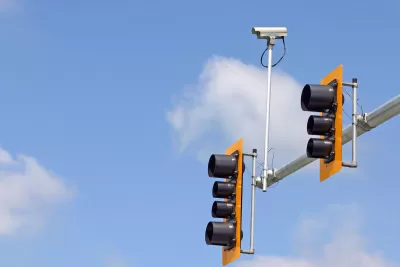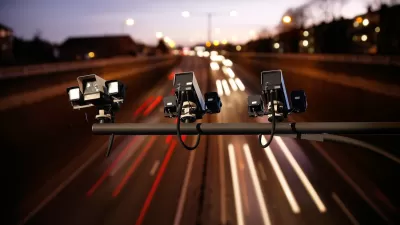Residents are wary of the new technology’s potential for surveillance, but support boosting enforcement while reducing interaction with police.

A new report outlines the opinions expressed by Boston community members in a series of focus groups that sought to understand how Black residents view the city’s road safety and traffic enforcement policies. Writing in Streetsblog Massachusetts, Christian MilNeil outlines the report’s findings.
Researcher Lindiwe Rennert, the study’s author, “found widespread agreement that the current system is not working well, particularly in Black communities, which face higher crash risks both from police violence and from dangerous roads.” But residents also expressed concern over violent interactions with law enforcement.
“The big takeaway was, cameras don’t have guns.” According to Rennert, “While there are civil liberties concerns associated with camera-based enforcement, the concern is de-escalated from loss of life, to an abuse of information. Both are important, but the scale is unquestionably different.” But participants also said new technology could set up new methods of surveillance and perpetuate discriminatory systems.
Based on the focus groups, Rennert makes some suggestions to lawmakers to implement successful automated enforcement programs: ensure fine revenues are directed to street safety and public transit, establish external oversight, limit how much cameras can see, use trusted agencies, and “right-size the penalty” to prevent outsized punishment for minor infractions.
FULL STORY: ‘Cameras Don’t Have Guns’ – Boston’s Black Community Weighs In On Camera-Based Traffic Enforcement

Planetizen Federal Action Tracker
A weekly monitor of how Trump’s orders and actions are impacting planners and planning in America.

DARTSpace Platform Streamlines Dallas TOD Application Process
The Dallas transit agency hopes a shorter permitting timeline will boost transit-oriented development around rail stations.

Congressman Proposes Bill to Rename DC Metro “Trump Train”
The Make Autorail Great Again Act would withhold federal funding to the system until the Washington Metropolitan Area Transit Authority (WMATA), rebrands as the Washington Metropolitan Authority for Greater Access (WMAGA).

Supreme Court Ruling in Pipeline Case Guts Federal Environmental Law
The decision limits the scope of a federal law that mandates extensive environmental impact reviews of energy, infrastructure, and transportation projects.

Texas State Bills to Defund Dallas Transit Die
DART would have seen a 30% service cut, $230M annual losses had the bills survived.

Bikeshare for the Win: Team Pedals to London Cricket Match, Beats Rivals Stuck in Traffic
While their opponents sat in gridlock, England's national cricket team hopped Lime bikes, riding to a 3-0 victory.
Urban Design for Planners 1: Software Tools
This six-course series explores essential urban design concepts using open source software and equips planners with the tools they need to participate fully in the urban design process.
Planning for Universal Design
Learn the tools for implementing Universal Design in planning regulations.
Roanoke Valley-Alleghany Regional Commission
City of Mt Shasta
City of Camden Redevelopment Agency
City of Astoria
Transportation Research & Education Center (TREC) at Portland State University
US High Speed Rail Association
City of Camden Redevelopment Agency
Municipality of Princeton (NJ)





























